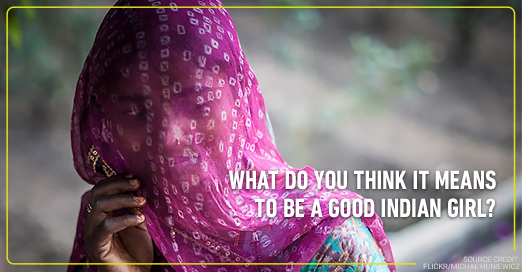The good Indian girl: Is it a norm that we need to question?

“Yaar, this never happens to good girls”, remarked a friend casually in a moment of whiskey aided candor during a heated debate. “This” referred to the rape and sexual violence that Jyoti Singh faced in 2012.
Normally, I would have asked what he meant by a good girl, but I was sickeningly aware that I knew EXACTLY how my friend, and most of India judge a girl’s “goodness”. Legitimizing statements like these were common after the Nirbhaya rape (and still are to this date). They come from growing up in a culture that creates strict norms about what it means to be a woman - what she is allowed to wear, how she lives and what she should NOT do.
How did these gender norms become a part of our society?
These ideas can be traced all the way back to the rules of Manu in 200 B.C.
"by a young girl, by a young woman, or even by an aged one, nothing must be done independently, even in her own house"
While not many of us still live by the rules of Manu today, these rules have been codified over time into behaviors and attitudes that have a bad influence on the status of women in India.
For example, while women have gained more independence in modern India, an ideal woman is one whose life and decisions are still firmly tied to her home and family.
It’s not surprising that 70% of women in modern India have faced physical and sexual violence when more than half the country’s adult population believes that such violence could be justified.
What are the repercussions?
Apart from affecting everyday lives, regressive gender norms have very real implications for India’s development. Practices like child marriage, dowry, honour killings, etcetera are deeply rooted in biases stemming from gender norms. Child marriages and early pregnancy alone cost India almost $56 billion annually and this is just one example showing how gender norms limit the growth potential of the country.
‘But I don’t think like that…’
Many of us do not even realise when we are being gender insensitive (take the Jaago Re Gender Sensitivity Quiz to know how gender sensitive you are). It’s easy to believe that these norms are a result of poor education and poverty and thus, not relevant to you. Unfortunately, despite rapid improvements in both primary and secondary schooling, the median age of marriage has only increased by 1 year since 1992. The preference for a male child actually increases with wealth, and even rich and urbane New Delhi has one of the worst ratios of girls to boys in India. These norms are very much a part of our lives and manifest in various ways right from pink playrooms for girls to our choice of adjectives - men are bosses while women are bossy.
What can I do to change this?
The good news is that these norms are constructed socially and are thus, subject to change. A good place to start is by taking gender sensitivity quizzes that uncover your unconscious gender biases. Being aware is the first step to understanding how biases affect the actions you take - are you sending different messages to your son and daughter? Do you judge female job candidates differently?
Most importantly, people need to talk about this with EVERYONE. One reason why gender norms are hard to change is that we never actively engage with them. So we need to talk to our friends, colleagues and staff on how we can address gender norms, even bring it up with the rickshaw wallah on the ride back from work. Most people don’t act out of the fear that they will never change, however norms do change over time, for example, did you know that for a century high heels were made for men while cheerleading was considered too masculine for girls?
The question is, will you take the first step?
Let us know your views on the article on our Facebook and Twitter pages, or email us at jaagorein@gmail.com.
Disclaimer:
The views expressed are those of the experts alone, and do not necessarily represent that of the brand.
About the Author:
Share this story on







